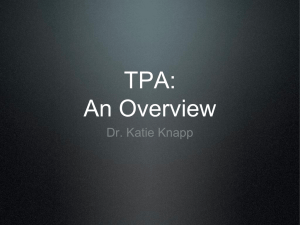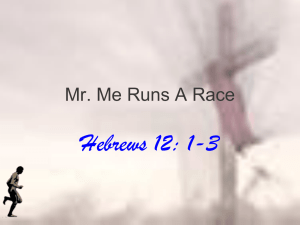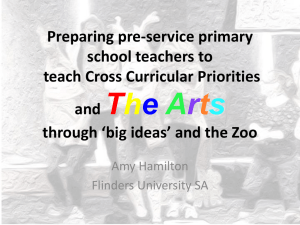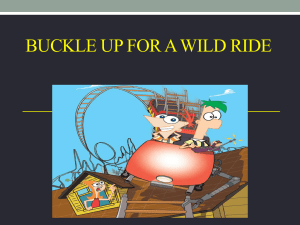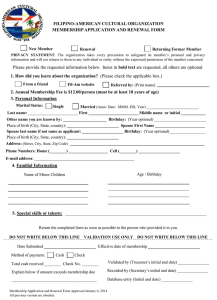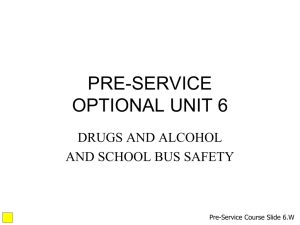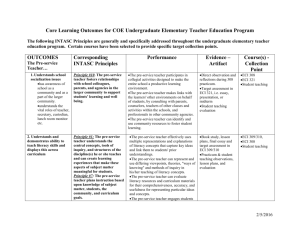Evacuation Concerns
advertisement
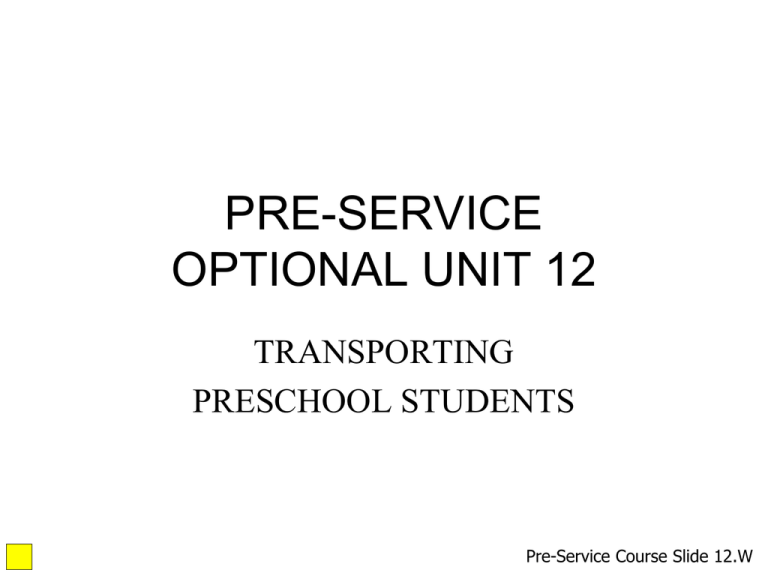
PRE-SERVICE OPTIONAL UNIT 12 TRANSPORTING PRESCHOOL STUDENTS Pre-Service Course Slide 12.W Optional Unit 12.1: Understanding the Preschool Child PRESCHOOLERS ARE… • • • • • • • Bet you Extremely unpredictable can’t catch me! Nappers – check carefully Can’t gauge traffic safety Bring an activity bag Play games, radio, sing Energizing, hilarious, exasperating Let them be helpers , Teach them bus safety – they want to learn! • Restraints keep them in their seats!* Pre-Service Course Slide 12.1.1,2 Optional Unit 12.1: Understanding the PreSchool Child TEACH THEM WELL GET THEM READY Pre-Service Course Slide 12.1.3 Optional Unit 12.2: Restraints for Pre-School Children on School Buses LEGAL REQUIREMENTS • All children under 4 must ride in an appropriate child safety restraint system (CSRS) • In a school van or car, children under 8 must ride in a CSRS • Make sure: – Height and weight match CSRS – No recalls – No damage to seat – Seat fits in bus* Pre-Service Course Slide 12.2.1 Optional Unit 12.2: Restraints for Pre-School Children on School Buses TYPES OF RESTRAINTS • Rear-facing infant seats – Stay rear-facing as long as seat allows • Forward-facing restraints • Secured with: – Seat belt – LATCH* Pre-Service Course Slide 12.2.2a Optional Unit 12.2: Restraints for Pre-School Children on School Buses TYPES OF RESTRAINTS cont. Integrated safety seats Booster seats with built-in harness Safety vests* Pre-Service Course Slide 12.2.2b Optional Unit 12.2: Restraints for Pre-School Children on School Buses PLACEMENT OF RESTRAINTS • Keep children toward the front • Never place in emergency exit row • No unrestrained passenger behind safety vest or booster seats • Read the instructions! Route lap belt per manufacturer’s instructions • Kneel on seat when tightening • Twist it up to 3 times – No knots* Pre-Service Course Slide 12.2.3 Optional Unit 12.2: Restraints for Pre-School Children on School Buses SECURING RESTRAINTS • Forward facing - Upper straps in reinforced slots at or above shoulders • Rear-facing – in slots at or below shoulders • Retaining clip at armpit level • Straps snug, Pinch Test • Touch briefly and sensitively • Clean with mild detergent • Check retirement date • Discard from serious accident • Discard with cracks or visible damage* Pre-Service Course Slide 12.2.4,-6 Optional Unit 12.3: Loading & Unloading PreSchool Children BUS STOP and CUSTODY CONCERNS • • • • Preschoolers are hard to see They are naturally impulsive Have a hard time with bus steps Release to approved adult – If no one’s home, keep the child on board – Reassure the child that everything’s OK – Contact base for guidance* Pre-Service Course Slide 12.3.1,2 Optional Unit 12.4: Evacuation Concerns EVACUATION PLANNING • Bus fires and preschoolers are very frightening • Buses can burn quickly in some situations • An evacuation plan should be created for : – An front enginegenerated fire – A crash-generated fire at the rear* Pre-Service Course Slide 12.4.1,2 Optional Unit 12.4: Evacuation Concerns • • • • • • • PRESCHOOL EVACUATION QUESTIONS Define driver and attendant roles Children evacuated in or out of the restraints? Unbuckle the child or cut the straps? Order to evacuate children? Avoid exit bottleneck What exit(s) will you use? Can you find exits in thick smoke? Keep children from wandering* Pre-Service Course Slide 12.4.3 Optional Unit 12.4: Evacuation Concerns USE A BUDDY SYSTEM • Teach young children to look out for each other • Teach them to use a buddy system or “safety chain” • Practice it at school in am • Use the fire blanket as a reference point • Use bystanders* Pre-Service Course Slide 12.4.4 Optional Unit 12.4: Evacuation Concerns EVACUATION PLANNING PRACTICE • • • Draw seating plan of a current bus showing each child With your trainer, decide on a realistic evacuation plan for both scenarios Use the Evacuation Plan form in your manual to write down your plan* Pre-Service Course Slide 12.4.5 Optional Unit 12.4: Evacuation Concerns • • • • It may be faster to cut harness straps Cut at an angle across a tight belt Should be located where you can reach it while seat-belted Practice cutting old belts with a seat belt cutter* SEAT BELT CUTTERS Pre-Service Course Slide 12.4.6 OPTIONAL UNIT 12 REVIEW 1. T or F? “The vision and 5. Where should the hearing of preschoolers is harness retaining clip be so good they can usually located? get out of the way of an 6. If you need to shorten approaching car” the lap belt slightly to 2. T or F? “Children under secure a car seat, what’s five need to be escorted on the acceptable method? and off the bus” 3. What type of booster seat 7. T or F? “On forwardmay be used on a school facing car seats, the bus? upper harness slots 4. T or F? “Sit unrestrained should be below the passengers behind children child’s shoulders”* in safety vests” Pre-Service Course Slide 12.Ra OPTIONAL UNIT 12 REVIEW cont. 8. T or F? “If no one is home at a preschooler’s house, tell the child to wait on the porch until someone gets home” 9. What’s a seat belt “stalk”? 10. T or F? “In most cases, the quickest way to get a child out of the bus in an emergency is to remove the child from the restraint”* Pre-Service Course Slide 12.Rb


